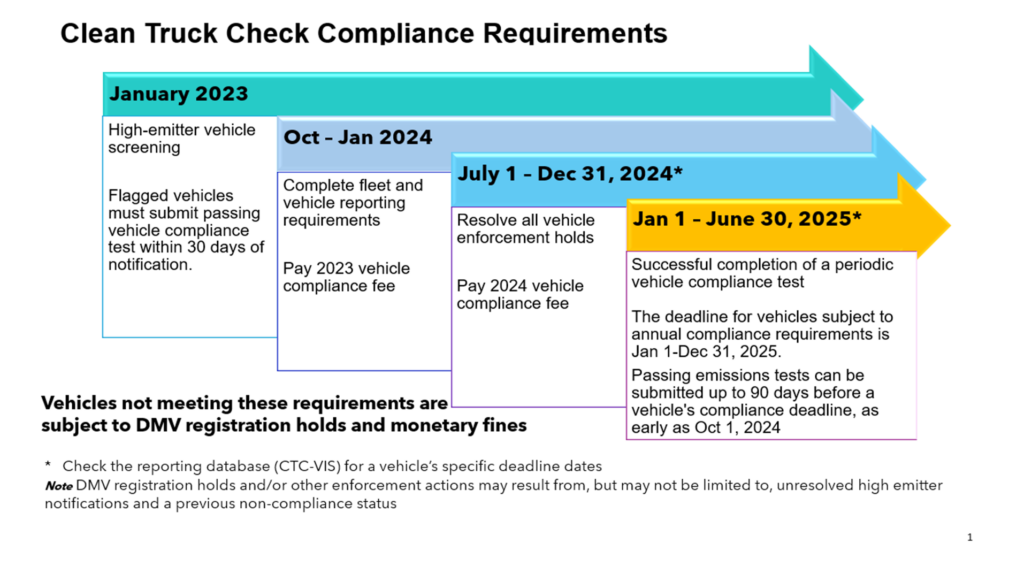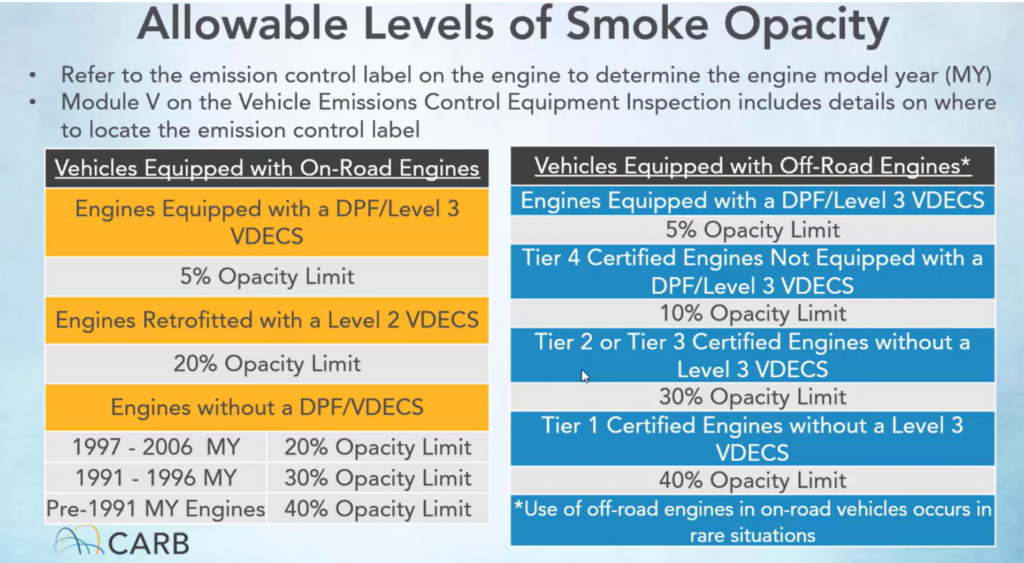Clean Truck Check is a regulation designed to ensure that heavy-duty vehicles’ emissions control systems are functioning correctly. It applies to most diesel and alternative fuel heavy-duty vehicles with a gross vehicle weight rating (GVWR) over 14,000 pounds that operate on California’s public roads and highways, regardless of their registration state. Covered vehicles include public fleet vehicles (federal, state, and local government), motorcoaches, transit, shuttle, and school buses, hybrid and commercial vehicles, personal vehicles, California-registered motorhomes, single-vehicle fleets, and out-of-state vehicles (excluding motorhomes).

The testing requirements depend on whether your vehicle/engine is equipped with OBD or not.
While most vehicles have an engine model year one year older than the vehicle model year, please refer to the vehicles emissions control label (ECL) on the engine to ensure you are performing the correct test for the vehicle.
OBD-equipped vehicles (2013 and newer diesel engines and 2018 and newer alternative fuel engines) are required to undergo a scan of the engine’s OBD data using a California Air Resources Board (CARB) certified OBD testing device.
Diesel non-OBD vehicles (2012 and older diesel engines) are required to complete a smoke opacity test and a visual inspection of the vehicle’s emissions control equipment, referred to in this program as the Vehicle Emissions Control Equipment Inspection. Alternative fuel non-OBD vehicles (2017 and older alternative fuel engines) are only required to complete the visual inspection and are not subject to the smoke opacity test requirement.
What are the Non-OBD smoke opacity standards?

Note: The information provided is subject to change. Please visit the CARB website to verify the most recent requirements.
Mobile Testing & Pre-Check Diagnostics by Clean Truck Check Specialists
Starting in early 2025, the California Air Resources Board (CARB) will begin enforcing the Clean Truck Check Program—a statewide initiative designed to identify and reduce high-emission vehicles. Under this new regulation, all heavy-duty vehicles over 14,000 lbs GVWR entering California must undergo emissions inspection testing.
With inspection costs ranging from $100 to $150 per scan, a failed test can mean wasted time, money, and operational delays. To make matters worse, CARB does not disclose the reason for a failed inspection.
That’s where Clean Truck Check Specialists come in. We provide FREE pre-check diagnostics using CARB-approved tools—so your fleet has time to address any issues before the 30-day repair clock starts ticking.
One of the most obvious indicators that a truck may fail inspection is the Check Engine Light, also known as the Malfunction Indicator Lamp (MIL). Our data shows that no vehicle with an active MIL has passed inspection.
Train drivers to report dash warnings promptly—while a lit MIL might be ignored in other states, in California, it can result in a vehicle being taken out of service. Technicians should also check for any active lamps or diagnostic trouble codes during vehicle intake to catch issues early and ensure they’re resolved prior to the scan.
Before submitting your vehicle for CARB testing, always perform a pre-test diagnostic scan. This allows your team to identify and resolve any issues that could cause a failure. We provide this service free of charge.
Use diagnostic data to guide repairs and ensure that any cleared fault codes meet CARB’s code-clearing criteria. For example, simply erasing a code without completing the required drive cycle can still result in a test failure. Confirm that each vehicle has met readiness requirements before proceeding.
CARB’s initial Clean Truck Check phase includes first-readiness criteria, which require a minimum level of operation since codes were last cleared (OSC). If a vehicle doesn’t meet the OSC threshold, it won’t pass—even if there are no fault codes present.
Here’s how the criteria break down:
5 Warm-Up Cycles (WUC): If WUC is not recorded, CARB will look for:
100 miles of OSC, or
200 minutes of engine run time since clearing.
These thresholds will increase over time, so it’s important to ensure vehicles have had sufficient operating time before testing.
Inactive or pending fault codes may not trigger a MIL, but they can still signal potential problems. Inactive codes may indicate recurring or intermittent issues that could resurface, while pending codes are early warnings of problems the system has identified but not yet confirmed.
Both types of codes should be reviewed and addressed during pre-checks to avoid unexpected inspection failures.
Many people in the trucking industry are used to handling problems on their own. However, when it comes to CARB regulations, there’s nothing wrong with asking for a hand. Our friendly staff will help you navigate the system to keep your vehicles active and on the road. We take the headaches out of CARB compliance!
© 2025 CTCSpecialists.com. All Rights Reserved.
This site is protected by reCAPTCHA and Google Privacy Policy, and Terms of Service apply.